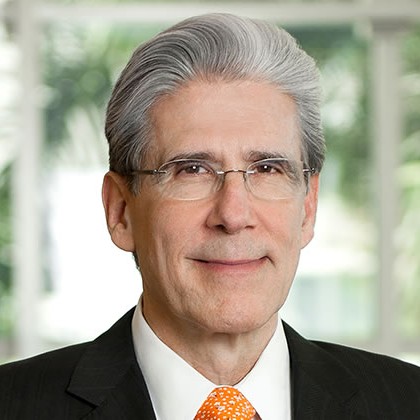
Since 2015, Julio Frenk has served as president of the University of Miami. He also holds academic appointments as Professor of Public Health Sciences at the Leonard M. Miller School of Medicine, as Professor of Health Sector Management and Policy at the Miami Herbert Business School, as Professor of Sociology at the College of Arts and Sciences, and as Professor of Health Studies at the School of Nursing and Health Studies.
Prior to joining the University of Miami, he served for almost seven years as Dean of the Harvard T.H. Chan School of Public Health and the T & G Angelopoulos Professor of Public Health and International Development, a joint appointment with the Harvard Kennedy School of Government. In September 2016, the Julio Frenk Professorship of Public Health Leadership was established at the Harvard T.H. Chan School of Public Health with an anonymous endowment gift.
Dr. Frenk was appointed Federal Secretary of Health of Mexico in 2000, a position he held for the full presidential term until 2006. In that position he pursued an ambitious agenda to reform the nation’s health system and introduced a program of comprehensive universal coverage called Seguro Popular, which expanded access to health care for more than 55 million previously uninsured persons.
He was the founding director-general of the National Institute of Public Health in Mexico, one of the leading institutions of its kind in the developing world. He also served as executive director in charge of Evidence and Information for Policy at the World Health Organization and as senior fellow in the global health program of the Bill & Melinda Gates Foundation, among other leadership positions.
Dr. Frenk holds a medical degree from the National University of Mexico, as well as a Master of Public Health and a joint Ph.D. in Medical Care Organization and in Sociology from the University of Michigan.
He has published 196 papers in academic journals, 182 articles in cultural magazines and newspapers, 29 books (including five novels for youngsters explaining the functions of the human body), 18 monographs, and 97 book chapters. His scholarly production has been cited more than 34,000 times.
Julio Frenk’s research has centered on health systems, a field where he has made both theoretical and empirical contributions. As part of his extensive work on the health transition, he has examined the public policy implications of large, long-term shifts in the dominant patterns of health and disease. He has also carried out work on health professions education and the medical labor market. As part of this line of work, he co-chaired the Lancet Commission on the Education of Health Professionals for the 21st Century, which published its influential report in 2010, triggering a large number of follow-up initiatives throughout the world. Dr. Frenk is also considered an expert on the complex relationship between globalization and health. More recently, he has been involved in various initiatives to reform higher education.
He is a member of the American Academy of Arts and Sciences, the U.S. National Academy of Medicine, the National Academy of Medicine of Mexico, and El Colegio Nacional (the most prestigious learned society of scientists, intellectuals, and artists in Mexico). He serves on the boards of the United Nations Foundation and the Robert Wood Johnson Foundation and has chaired the board of the Institute for Health Metrics and Evaluation since its founding in 2007.
Julio Frenk has received numerous recognitions, including the Clinton Global Citizen Award, the Bouchet Leadership Medal presented by Yale University for promoting diversity in graduate education, and the Welch-Rose Award from the Association of Schools and Programs of Public Health, as well as honorary degrees from 12 universities in the U.S., Canada, Mexico, and Europe.
In summary, Dr. Frenk’s career has included leadership positions in all relevant aspects of public health and higher education: research, teaching, analysis of public policies, institution-building, international cooperation, and national public service.
